Watch out! Why are birds dive-bombing you? Here's what you should know if a bird is scolding or swooping down in your direction.
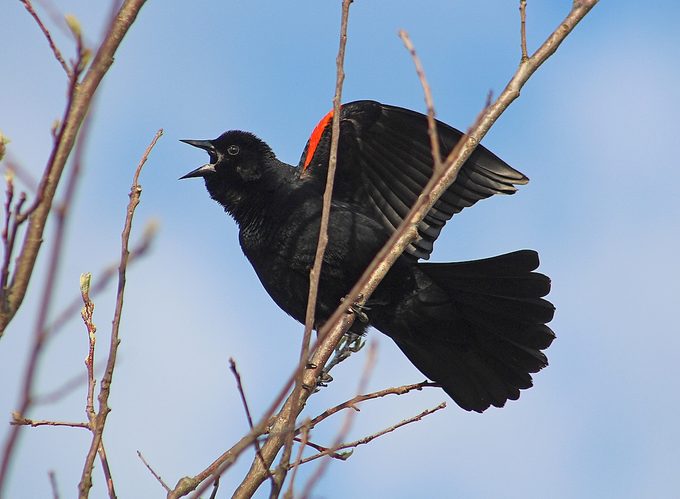
If a Bird Is Dive-Bombing You, This Is Why

Picture this: It’s a lovely spring or summer day, and you’re on a walk in the park. Blue skies and puffy clouds hang overhead, sunshine and warmth have greened up the grass, and melodic birdsong perfumes the air. But wait — one of those birds is swooping at you. It’s making noise. It sounds irritated. Why would birds start dive bombing you? You were just walking!
Here’s how, through no fault of your own, you might get on a bird’s bad side. Plus, learn how to place less stress on birds during nesting season.
On This Page
Why Bird Dive-Bombing Happens
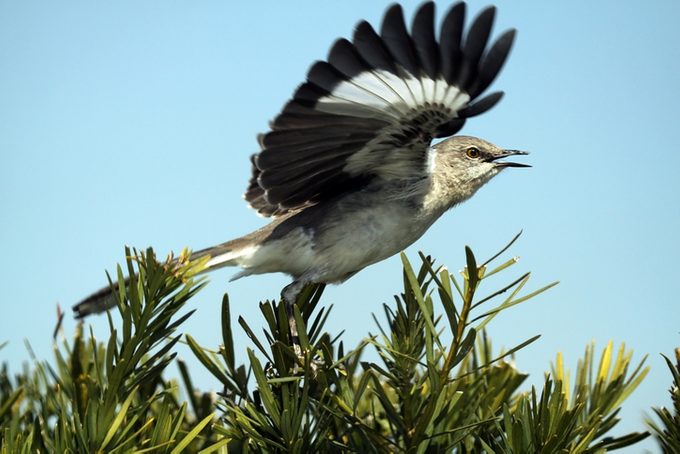
“The primary reason a bird would swoop at a person is nest defense,” says Robyn Bailey, NestWatch Project Leader at the Cornell Lab of Ornithology. “If you approach their nest too closely — and this can be subjective based on an individual bird’s perception of risk — you may have a bird swooping down at you.”
Robyn mentions that in some birds dive-bombing is more likely than in others. She specifically mentions mockingbirds and red-winged blackbirds, while also noting that other birds are more secretive nesters and count on humans not taking notice of them.
Are Birds Scolding You?
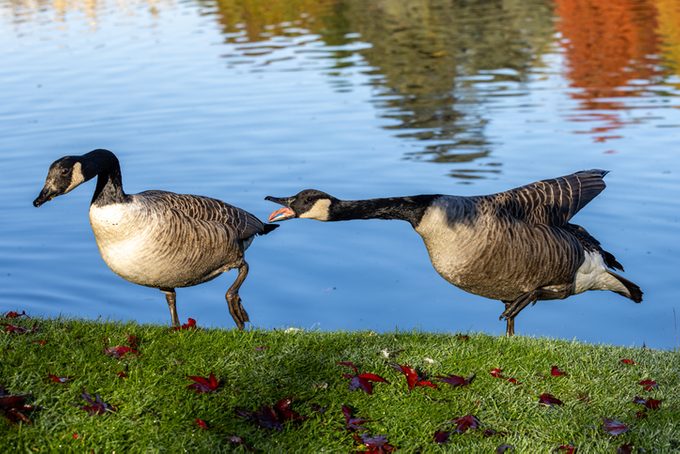
More common than swooping, Robyn explains, is causing a ruckus: it’s a behavior she refers to as scolding. “These are harsh, repeated sounds, unlike the bird’s usual songs and calls, that a bird may direct at you to usher you away,” she says. “If you feel like you’re being ‘told off’ by the bird, you probably are!”
It’s best to leave the area if you find yourself on the receiving end of a bird-rant. In fact, you might’ve experienced scolding without knowing that’s what it was. Hissing Canada geese frequently exhibit this behavior, as do vultures.
Birds Use Behavior as a Distraction
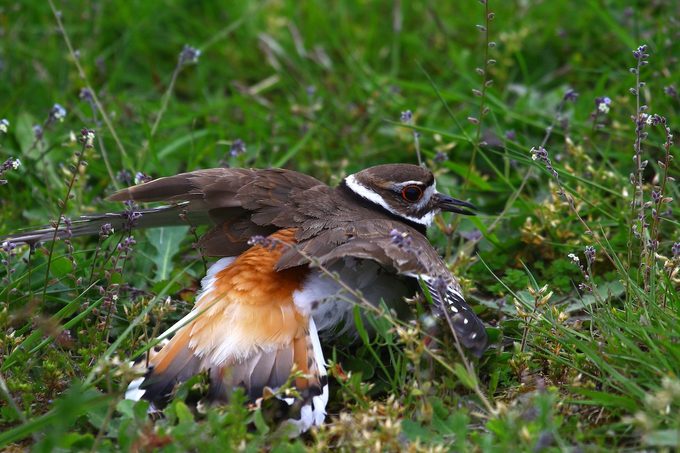
Finally, some birds employ trickery as a tactic. Distraction displays, Robyn says, involve a parent bird calling attention to itself to draw a danger away from its nest — consider a killdeer loudly feigning injury. “If successful, this piteous display ends with the bird flying off, perfectly fine, to return to the nest,” she says.
Become a nest expert and learn how to identify different types of bird nests.
What to Do If You’re Being Swooped by a Bird
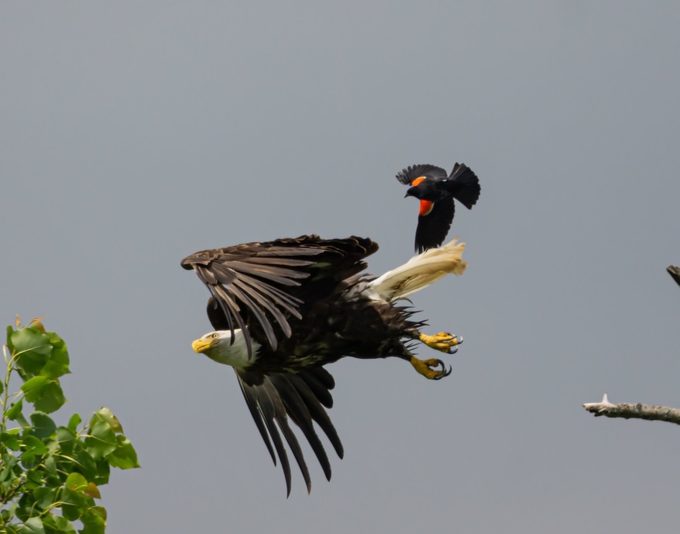
If a bird lets you know it’s time to go, first and most importantly, stay calm. “In most cases the bird will not make contact, so it’s important not to panic,” Robyn says. “In the vast majority of cases involving small backyard birds, the swooping is a bluff. However, they’re still expressing their discomfort, which we should try to respect by not lingering in the area.”
That said, Robyn says some birds will make contact, including red-tailed hawks, peregrine falcons, and American goshawks. In those cases, it might be a good idea to avoid a trail or wear a hard hat if you have to enter the area. In most parts of the U.S., nesting season winds down by late July and early August, so these bird behaviors should lessen by then unless adult birds continue to defend fledglings.
Avoid the Nesting Location If Possible
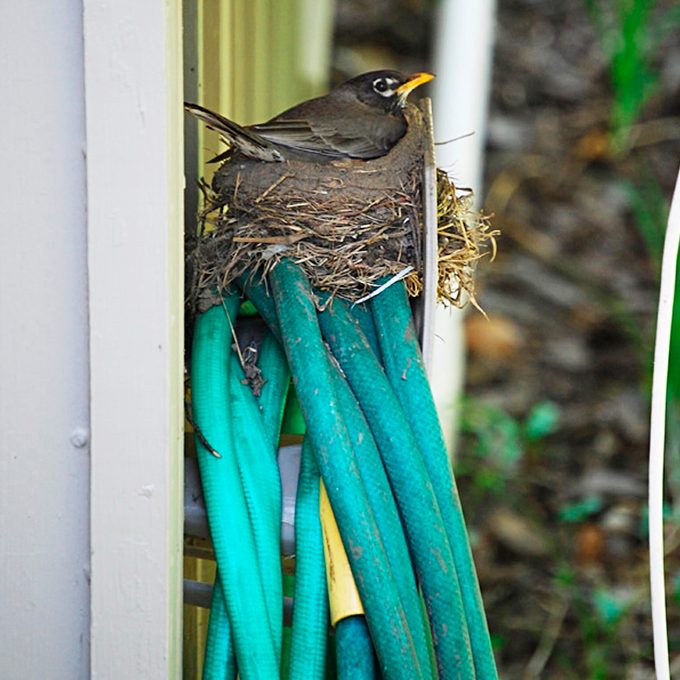
If a bird builds a nest in an inconvenient area, Robyn recommends using a different door or path, or finding a different place to sit. Never try to relocate a nest. Not only is it illegal, but, however well-intentioned, your actions could cause the nest to fail.
It’s important to understand, ultimately, that swooping or scolding are acts of defense for birds, and we humans should show some understanding. “Even though these behaviors may be flinch-inducing or scary to us, the birds are deadly serious about protecting their young, just as you would be,” Robyn says. “Be empathetic, and maybe wear a hat or carry an umbrella if you’ve got a persistent bird on your hands.”
RELATED:
- Do Birds Reuse Nests or Live in Nests Year-Round?
- Why Are My Backyard Birds Fighting?
- Are Hummingbirds Territorial at Feeders and Flowers?
About the Expert
Robyn Bailey manages the research, education, and communication initiatives for NestWatch, the Cornell Lab of Ornintholgy’s citizen-science project focused on nesting birds. Robyn has a master’s degree in fisheries and wildlife from Michigan State University.




















